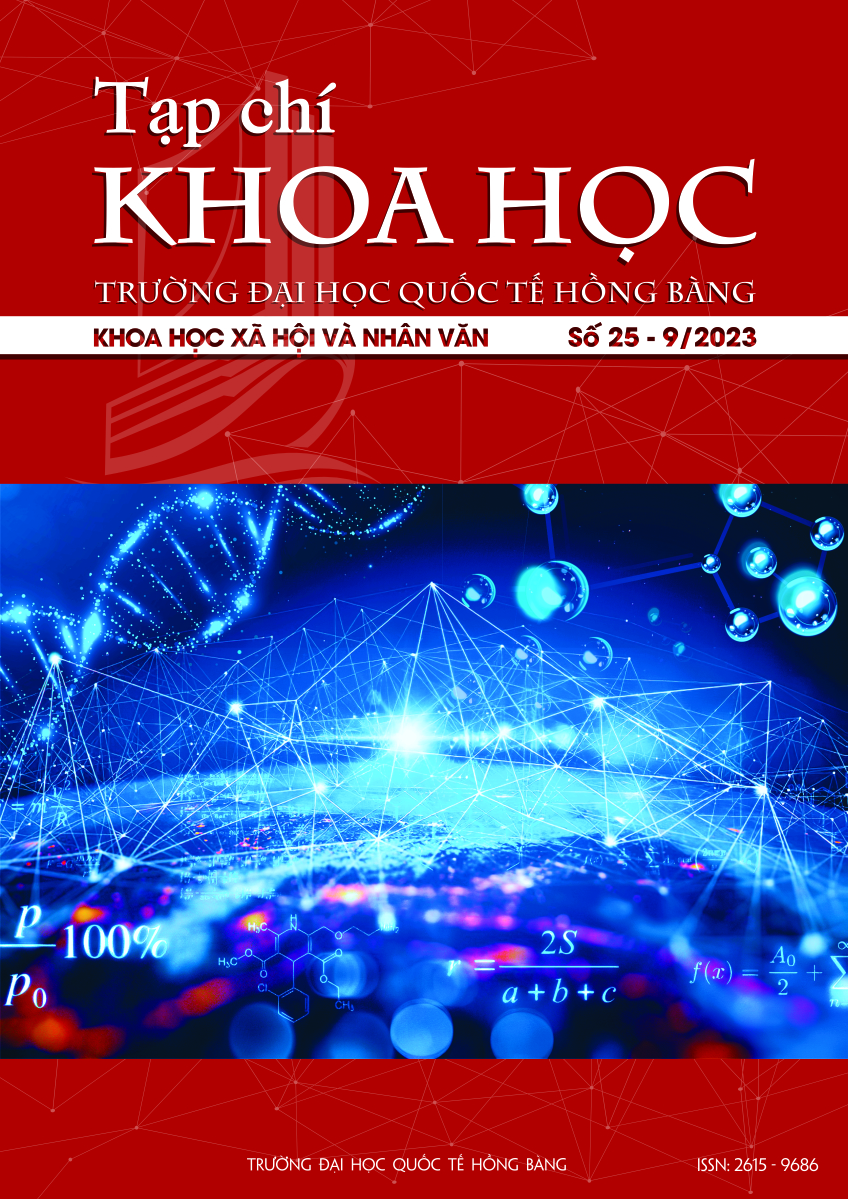Đổi mới phương pháp dạy học trong đào tạo giáo viên tiểu học thời kì chuyển đổi số
Các tác giả
DOI: https://doi.org/10.59294/HIUJS.25.2023.503Từ khóa:
đổi mới, phương pháp dạy học, chuyển đổi số, đào tạo, giáo viên tiểu họcTóm tắt
Kỷ nguyên 4.0 và chuyển đổi số đã tác động mạnh mẽ đến nhiều lĩnh vực, trong đó có giáo dục. Nâng cao chất lượng dạy và học thông qua việc sử dụng công nghệ mới là mục tiêu hàng đầu của hệ thống giáo dục đại học. Đổi mới phương pháp dạy học trước tác động của chuyển đổi số là nhiệm vụ cần thiết, cấp bách. Một cách tiếp cận phổ biến là đổi mới phương pháp dạy học gắn với ứng dụng công nghệ số nhằm mục tiêu phát triển năng lực người học, giúp sinh viên bộ môn tiểu học ra trường dạy tốt chương trình giáo dục phổ thông 2018. Bài viết này đề cập đến sự cần thiết và đề xuất một số phương pháp dạy học hiệu quả thời kì chuyển đổi số trong đào tạo giáo viên tiểu học như phương pháp trò chơi hóa, dạy học theo dự án, dạy học hợp tác, dạy học nêu và giải quyết vấn đề.
Abstract
The 4.0 era and digital transformation have strongly impacted many fields, including education. Enhancing the quality of teaching and learning through the use of new technology is the top priority of the higher education system. Innovating teaching methods to cope with the impacts of digital transformation is a necessary and urgent task. A common approach is to innovate teaching methods with the aim of developing learners' capacities, helping elementary school students graduate from school to teach the general education program well in 2018. This article addresses the need for design and propose some effective teaching methods in the digital transformation period in primary school teacher training such as gamification, project-based teaching, problem-solving and problem-solving teaching, and cooperative teaching.
Tài liệu tham khảo
[1] Kaminskyi, O. Y., Yereshko, Y. O., & Kyrychenko, S. O., Digital Transformation of University Education in Ukraine: Trajectories of Development in the conditions of New Technology and Economic order, Information Technologies and Learning Tools, 2018, 64(2), 128-137. https://doi.org/10.33407/itlt.v64i2.2083
[2] Büyükbaykal, C. I. (2015). Communication Technologies and Education in the Information Age. Procedia - Social and Behavioral Sciences, 174, 636-640. https://doi.org/10.1016/j.sbspro.
2015.01.594
[3] T. C. Đạt. Cẩm nang chuyển đổi số. NXB Thông tin và truyền thông, 2021.
[4] Kadarisman, Marisa, Asnah M.N. Limbung, Suryo Prabowo. Training on the Development of Utilization of Digital Teaching Materials for Teachers to Improve Student Learning Outcomes. Jurnal Teknologi Pendidikan, December 2022, 24 (3), 400-411. DOI: https://doi.org/10.21009/jtp.
v24i3.31799. p-ISSN: 1411-2744 e-ISSN: 2620-3081
[5] Strutynska, O.V.; Torbin, G.M.; Umryk, M.A.; Vernydub, R.M. Digitalization of the educational process for the training of the pre-service teachers. In Proceedings of the 8thWorkshop on Cloud Technologies in Education, CEURWorkshop Proceedings, Kryvyi Rih, Ukraine, 18 December 2020.
[6] Bond, M.; Marín, V.I.; Dolch, C.; Bedenlier, S.; Zawacki-Richter, O, Digital transformation in German higher education: Student and teacher perceptions and usage of digital media,. Int. J. Educ. Technol. High. Educ, 2018, 15, 1-20, 2018.
[7] Al Rawashdeh, A.Z.; Mohammed, E.Y.; Al Arab, A.R.; Alara, M.; Al-Rawashdeh, B., “Advantages and disadvantages of using E-learning in university education: Analyzing students' perspectives”, Electron. J. e-Learn, ,19, 107-117, 2021.
[8] RonnyScherera JoTondeurb Fazilat Siddiqc EvrimBarand, “The importance of attitudes toward technology for pre-service teachers' technological, pedagogical, and content knowledge: Comparing structural equation modeling approaches”, Computers in Human Behavior, 80, 67-80, 2018.
[9] Bergan, S. The EHEA at the Cross-Roads. The Bologna Process and the Future of Higher Education [Overview Paper]. InThe European Higher Education Area: Between Critical Reflections and Future Policies; Springer International Publishing: Cham, Switzerland, pp. 727-742, 2015.
[10] Amrullah, Z., “Student-material Interaction in Online Learning during the COVID-19 Pandemic”, Call-Ej, 23(4), 76-102, 2022.
[11] Coman, C., Țîru, L. G., Meseșan-Schmitz, L., Stanciu, C., & Bularca, M. C. (2020). Online teaching and learning in higher education during the coronavirus pandemic: Students' perspective. Sustainability (Switzerland), 12(24), 1-22. https://doi.org/10.3390/su122410367
[12] Zhongyong Jing, Daoxin Wang, Yu Zhang (2023), “The Effect of Virtual Reality Game Teaching on Students' Immersion”, International Journal of Emerging Technologies in Learning (iJET) - eISSN: 1863-0383, Vol 18, No 08, 2023.
[13] Souza, V., Maciel, A., Nedel, L., Kopper, R., Loges, K., Schlemmer, E. “VR neuro game: a virtual reality game to support neuroanatomy teaching and learning”, Journal on Interactive Systems, 12(1), 253-268, 2021. https://doi.org/10.5753/jis.2021.2090
[14] Gama, J.A.P. Intelligent educational dual architecture for University digital transformation. In Proceedings of the 2018 IEEE Frontiers in Education Conference (FIE), San Jose, CA, USA, 3-6 October, pp. 1-9, 2018.
[15] Josef Siljebo, Digitalization and digital transformation in schools: a challenge to educational theory?, Volume 27(2), Remote teaching to ensure equal access to education in rural schools, 17 December 2020, https://www.abdn.ac.uk/education/research/eitn/journal/610.
Tải xuống
Tải xuống: 890











